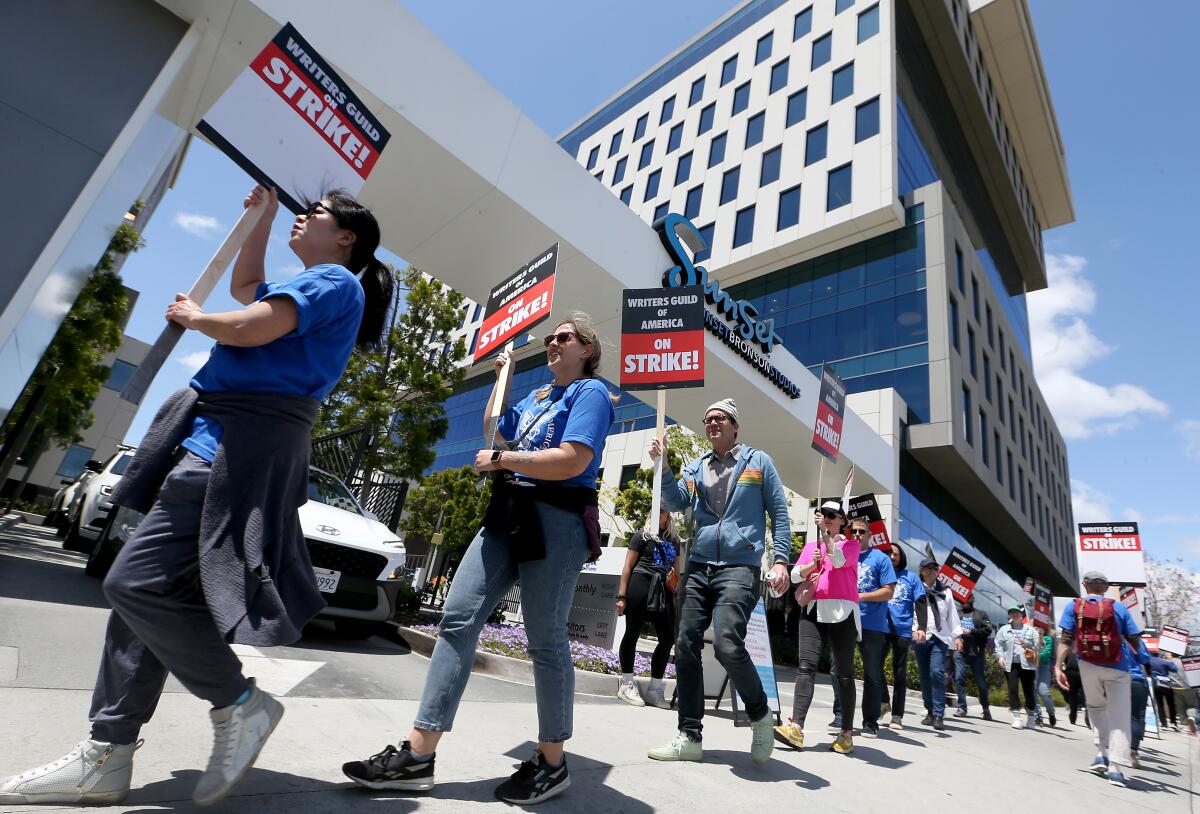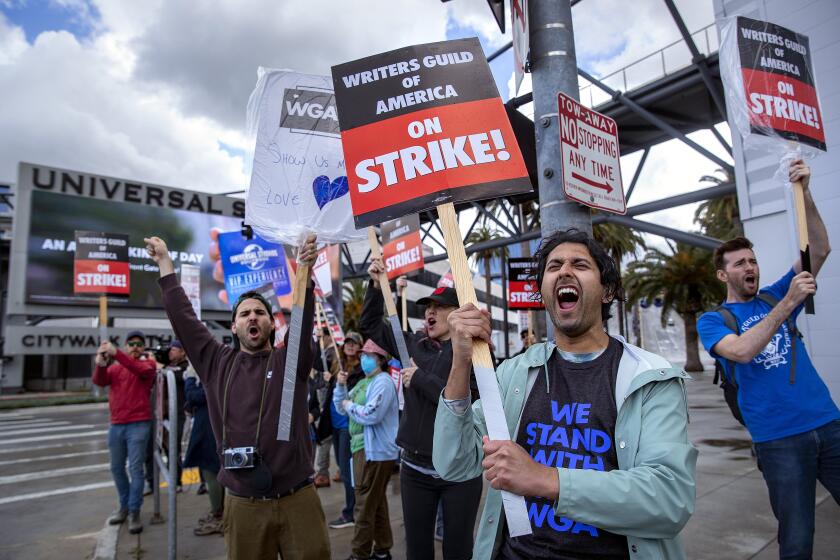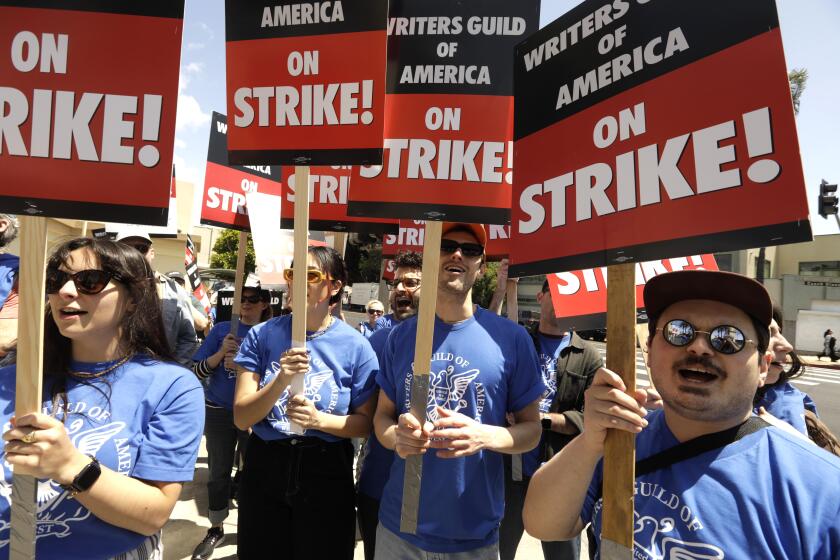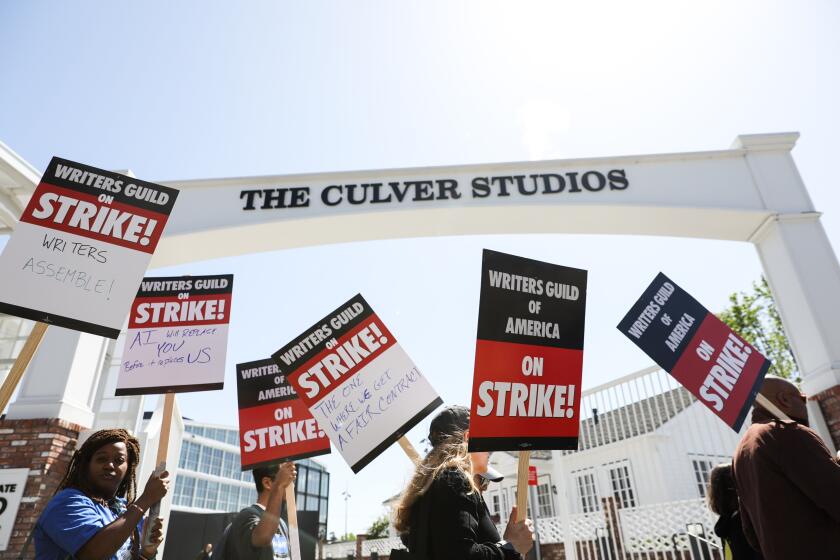Striking Hollywood writers start looking for new gigs. Here are some ideas

- Share via
Ask veteran film and TV professionals about the early days of their careers and they’ll often rattle off a list of the odd jobs they did to make ends meet.
The writers’ strike could force many of them to revisit those days. But then, scrambling to earn a living is familiar territory to many of the roughly 11,500 members of the Writers Guild of America (and to many others in the film and TV industry).
According to workers from across the industry, many members of the cast and crew work as freelancers who earn their living from a succession of gigs. And in the case of TV writers, those gigs have shrunk in duration, as shows have gone from more than 20 episodes per season to as few as half a dozen.
So there’s a feast-or-famine quality to the entertainment industry, especially for the vast majority of writers who aren’t in the profession’s top tier. (Those are the showrunners, executive producers and co-executive producers, a group that includes the likes of Shonda Rhimes and Ryan Murphy.)
Hollywood writers formed picket lines in L.A. and New York after the Writers Guild of America called a strike for better pay and working conditions.
If the 2007 walkout is any guide, many writers will use the current strike as an opportunity to work on ideas for books and scripts they haven’t yet finished or sold. Will Richter, a novelist and writer of features and documentaries, including “We Stand Alone Together: The Men of Easy Company” for HBO, said there was a surge of material released at the end of 2007. “Writers are writers,” Richter said. “They’re going to be thinking, ‘OK, what’s my best use of time here?’”
He added, “Most of the people I know just laid low, reduced their expenses, and knew that if they toughed it out, there would be an agreement.”
Others in Hollywood will focus more on side hustles, such as teaching at a local film school. One challenge, though, is that a common source of fallback jobs — working in a lower capacity within your field of expertise, such as down-shifting into an assistant role on a film or TV show — will be less plentiful as the strike shuts down productions without finished scripts.
For writers, that means looking for jobs that aren’t covered by the Writers Guild of America’s contract with the Alliance of Motion Picture and Television Producers. One possibility is writing for commercials. Another is working on documentaries. A third is unscripted television, which took off during the writers’ 100-day walkout in 2007.
Most viewers might associate so-called reality TV with such fare as “The Bachelor” and “Keeping Up With the Kardashians,” but it has become a broad category. Zach Ayers, a writer on BET’s “American Soul,” now works as a story producer for National Geographic’s “Life Below Zero: First Alaskans,” and he says he wishes more writers would consider this kind of work.
Hollywood is girding for the first big labor showdown since 2007-08 as members of the Writers Guild of America vote to authorize a possible strike. What got us here?
“I have found unscripted television to be a wonderful place to find some stability during turbulent times in scripted TV. And I have tried to point some [writers], especially some of the lower-level writers that I know, in this direction,” Ayers said in an email. “But I think that up until now, it’s required them to put off all the scripted dreams that they have.”
The 2007 strike also saw writers turning to employment agencies and temporary assignments outside the entertainment industry. In fact, that’s where some writers continue to find side hustles when they can’t sell a script or earn one of the shrinking number of places in a TV series’ writers room.
Brett Good, a senior district president for the staffing firm Robert Half, says plenty of other industries can use what Hollywood writers can provide. And it’s not hard to find work for a striker who may go back to a Hollywood job at any point, Good said, because the “gig market is certainly alive and well in corporations.”
What film and TV writers do day in and day out, Good said, is find creative ways to get a message across. “They have a skill set that, candidly, can be at a premium if applied in other areas,” he said, adding that the opportunities are there “if they’re also willing to upskill themselves and think a little bit differently.”
Within the corporate world, for example, there’s a need for people to write speeches, technical manuals, scripts and financial documents, among many other things, Good said. The demand is in such areas as marketing and advertising, public and investor relations, human resources, diversity, equity and inclusion, training and customer service, he said.
“So much of what we see is shorthand and GIFs and memes and things of that nature, and I am of the bias that coherent, comprehensive and cogent writing is a skill that is in high demand, because it’s a skill that seems to be diminishing in the broader population,” Good said.
There are several funds available that can provide temporary assistance for those in dire financial situations due to the strike.
Cyndi Nieto, partner at Elite Placement Group in Beverly Hills, struck a more pessimistic note. Her agency mainly provides administrative and executive assistants, and the calls she’s received for temporary help have plummeted since the pandemic. (Temporary jobs took a massive hit in early 2020, according to Federal Reserve data, but they rebounded quickly and are near their all-time high nationally. The same is true for part-time jobs.)
“A lot of those jobs that companies would call in a temp for, they just do without these days,” Nieto said.
Still, she said, she’s found Hollywood writers to be valuable assets. “They’ve got great skills, they’re self-motivated, they get things done,” she said, adding that, unlike actors, “they’re not [suddenly] shooting a commercial and out for three days.”
There may be plenty of opportunities for writers outside the entertainment industry, Richter said, but they’re not necessarily appealing. “I barely survived two grinding weeks writing social media posts for a nonprofit,” he said in an email. “To have meaningful work where you’re creating, writing an actual story, that’s what you’re always looking for. Nothing else is going to be fulfilling in the same way.”
What can you work on, or not, during the writers’ strike? Here’s what Hollywood writers need to know.
Ayers agreed.
“There’s nothing shameful about it,” he said, referring to working as a writer for a corporation.
But writing for television “requires you to have a bit of tunnel vision,” Ayers said. “The work you do as a writer requires you to commit to the bit.”
He added, “If you just told your agent, ‘I have this great idea,’ and the agent said, ‘Get that idea ready, we’re going to pitch the town,’” regardless of the strike, “you’re still down in your computer, still trying to finish this idea. Because once you look up, it’s hard to get back down.”
About The Times Utility Journalism Team
This article is from The Times’ Utility Journalism Team. Our mission is to be essential to the lives of Southern Californians by publishing information that solves problems, answers questions and helps with decision making. We serve audiences in and around Los Angeles — including current Times subscribers and diverse communities that haven’t historically had their needs met by our coverage.
How can we be useful to you and your community? Email utility (at) latimes.com or one of our journalists: Jon Healey, Ada Tseng, Jessica Roy and Karen Garcia.
More to Read
Inside the business of entertainment
The Wide Shot brings you news, analysis and insights on everything from streaming wars to production — and what it all means for the future.
You may occasionally receive promotional content from the Los Angeles Times.















